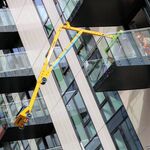The shock value alone of the Provincial Cons talking transit is hopefully enough to push the desperate Liberals into a higher gear. They never had any competition on transit so the Cons sliding closer to centre is a great sign
Yes, the prospect that the Tories will have Transit Platform A will force the Liberals to be much clearer on what their Transit Platform B will be. Neither will be perfect, but that's a much more appealing basis for a debate than one party saying "Do X" and the other saying "Cancel X".
Some detailed things that ought to be probed:
- Will the Tories support the Halton Bypass? How would they resolve the impasse with CN ? (And with CP to Milton?)
- Will the current project strategy (via IO) stand?
- Will the Taj Mahal station construction strategy stand?
Anybody know what the delta is to go from AD2W to RER? Is it a situation where if the PCs go ahead with AD2W, they still need to finish all the enabling works going on? Would it simply mean that electrification and conversion to RER gets delayed or a few years, with work after full AD2W? Or is it one of those situations where AD2W does not move the ball substantially on RER?
I am still surprised they aren't pushing for RER. Room for Liberals to differentiate and capture 905 votes....
It's really pretty binary. Electrification enables RER. No electrification, no RER. And likely no ST either. If there is no electrification, headways are likely to remain in the 30 minute zone at best. That vision might in turn cause some elimination of bells and whistles - less new trackage, etc, although the really fundamental track projects will be "in progress" by election season so would likely be protected by the "keep things moving" promise.
The Tories could defuse a Liberal RER push by promising to electrify something (like UPX, and possibly Barrie, since the Davenport solution turns directly on a promise that it will be electrified) but coast on going further. Frankly, a demonstration RER line might be good strategy to win the public over.
PTC (by any acronym) will be interesting. It would be hard for the Tories to cancel it without handing the Liberals a good talking point.
At this point one has to be a bit suspicious that the Tories are heading towards RER Lite, but in a very gracious and non-Mike-Harris way. So the probing needs to carry on. The bright side is, it gives so much room to challenge Wynne and DD on why they have talked so expansively but only delivered on some of it. I'm really looking forward to this debate.
- Paul




